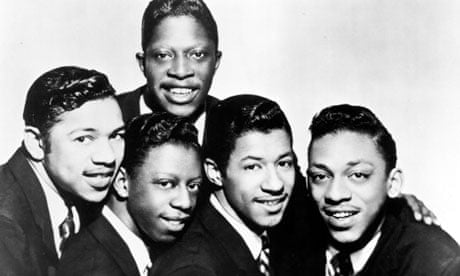For the last three decades of their existence as a doo-wop vocal quartet, the Cadillacs performed their 1950s hits only at the weekends. That was to accommodate the priorities of their lead singer, Earl "Speedo" Carroll, who has died aged 75. Carroll spent the weekdays working as a janitor at a New York elementary school, where he would regale the pupils with tales of his life as the voice of such favourites as Gloria, Zoom and Speedoo, the song that took its narrative – "Well now they often call me Speedo / But my real name is Mr Earl" – from Carroll's own personality.
His nickname – at first "Speedy" and then "Speedo", but confusingly misspelled as "Speedoo" when it appeared on the label of a record – was bestowed ironically during his adolescence in Harlem, when he and three schoolfriends formed a group called the Carnations. Street-corner vocal groups were growing in popularity, with competitions between rivals at local dances and each outfit striving to establish its originality. It was at a talent show in 1953 that the Carnations were spotted by Lover Patterson, the manager of the successful Five Crowns, who brought their potential to the attention of Esther Navarro, a secretary at the powerful Shaw Artists booking agency.
Carroll, the lead singer, and Bobby Phillips, the bass vocalist, decided to leave the Carnations and add two more members to form a new group under Navarro's management. After much discussion concerning a name, one of the group spotted a pink Cadillac driving by, and the decision was made. Navarro wrote to General Motors to receive permission and the name appeared on the group's first release on the Josie label in 1954.
I Wonder Why was the original A-side, but disc-jockeys preferred the flipside, a ballad titled Gloria, based on an old song but heavily restyled by Navarro. Teenagers responded immediately to Carroll's mournful vocal, with its a capella opening followed by a lovestruck lyric: "It's not Marie, it's Gloria / It's not Sheree, it's Gloria / But she's not in love with me ..." The song went to No 3 in Billboard's rhythm and blues charts and made the national pop top 40, and the group appeared on that year's Christmas show fronted by the disc jockey Alan Freed at the Brooklyn Paramount, with Count Basie and LaVern Baker.
Gloria demonstrated Carroll's ability to slip in and out of the falsetto register, and his command of a striking but not overemphatic vibrato. The Cadillacs also had two other important assets: their slick stage uniforms and their synchronised choreography, developed under the supervision of the great Harlem choreographer Cholly Atkins, who had already groomed the stage movements of Sonny Til and the Orioles and would go on to devise the spectacular stage presentations of Gladys Knight and the Pips, the Miracles and the Temptations.
None of the Cadillacs' follow-up hits – including snappy up-tempo numbers such as Zoom and Speedoo – matched the chart success of Gloria, but they performed the novelty songs Please Mr Johnson and Jay Walker in Go Johnny Go! (1959), a rock'n'roll exploitation flick featuring Chuck Berry, Eddie Cochran, Richie Valens and Jackie Wilson, and fronted by Freed, whose career was soon to be destroyed by the payola scandal.
According to Dion DiMucci, a later graduate of the street-corner vocal scene, Gloria became a test piece for young groups, and it remains a classic of the genre. But although many others attempted to capitalise on their success with a car name – the Lincolns, the Edsels, the Corvairs, the Fleetwoods and the El Dorados among them – the Cadillacs split asunder in 1956, with more than one group claiming the right to use the name. They reunited in 1958 with a single titled Speedo Is Back, but despite further recordings the group was effectively defunct by 1960, and the following year Carroll joined the Coasters. Replacing Cornell Gunter alongside the original members Carl Gardner and Billy Guy, he sang on the minor hits (Ain't That) Just Like Me and DW Washburn, and stayed with the group until 1979.
He left them when he and Phillips re-formed the Cadillacs as the result of a request to appear in a TV commercial for Subaru cars. They re-emerged on the oldies circuit, with Carroll as their polished and engaging frontman, and made many concert and television appearances. In 1982, he also took a job as a superintendent at the William T Sherman school in Manhattan, where he had gone to take adult literacy classes in order to overcome a reading disability. Generations of the school's pupils knew the man with the mop and bucket as "Speedo".
His wife Carol died in 2010; he is survived by a son, Earl Jr, a daughter, Kimmie, and three grandchildren.
